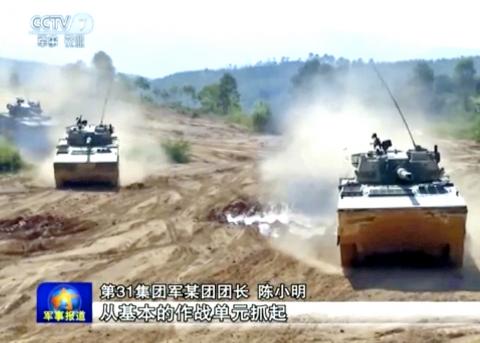Chinese military exercises earlier this week were aimed at threatening Taiwan ahead of today’s presidential inauguration, Ministry of National Defense officials told legislators yesterday, adding that the armed forces are ready to defend the nation.
Democratic Progressive Party Legislator (DPP) Tsai Shih-ying (蔡適應) questioned the ministry’s response on Tuesday, when it said that war games conducted by the Chinese People’s Liberation Army’s (PLA) 31st Group Army based in Fujian Province were “routine exercises, which are conducted annually.”
The ministry is “fully aware of it and is constantly monitoring it,” it added.

Photo: CCTV via AP Video
Not satisfied with the response, DPP lawmakers questioned ministry officials at yesterday’s meeting of the legislature’s Foreign Affairs and National Defense Committee.
“I do not believe it is merely a routine exercise by the PLA. They conducted large-scale war games with live-fire weapons and amphibious landings at a southeast coastal area near Taiwan,” Tsai said. “China is doing it this week and broadcasting it on state media for the world to see, just before our presidential inauguration ceremony. Is this routine or just a coincidence? I do not think so.”
Ministry officials said that the PLA war games were likely aimed at sending a political message to Taiwan and to put pressure on president-elect Tsai Ing-wen (蔡英文) to acknowledge the “one China” principle and the so-called “1992 consensus” in her inaugural address.
Vice Minister of National Defense Hsu Pei-shan (許培山) said China has persisted in its military threats and missile deployment against Taiwan, and has shown no signs of letting up.
Tsai Shih-ying asked the ministry if the nation’s troops are ready for the incoming administration and if they are prepared to defend Taiwan in case of war.
He added that there are rumors that some military officials and their units are troubled by the prospect of a female commander-in-chief and do not want to take orders from the new president.
Hsu said there is no such problem.
“The armed forces are loyal to our nation, no matter which political party holds power. We obey the laws of the nation and will serve the new president, who is the highest civilian leader of our country as elected by the people,” he said.
DPP legislators asked the ministry to use its internal media outlets to disseminate this message to all military troops pledging allegiance to the president and the nation.
Hsu and other defense officials said that after today’s inauguration, all photographs of President Ma Ying-jeou (馬英九) would be taken down in military offices and replaced by photographs of Tsai Ying-wen over the next few days.

SECURITY: As China is ‘reshaping’ Hong Kong’s population, Taiwan must raise the eligibility threshold for applications from Hong Kongers, Chiu Chui-cheng said When Hong Kong and Macau citizens apply for residency in Taiwan, it would be under a new category that includes a “national security observation period,” Mainland Affairs Council (MAC) Minister Chiu Chui-cheng (邱垂正) said yesterday. President William Lai (賴清德) on March 13 announced 17 strategies to counter China’s aggression toward Taiwan, including incorporating national security considerations into the review process for residency applications from Hong Kong and Macau citizens. The situation in Hong Kong is constantly changing, Chiu said to media yesterday on the sidelines of the Taipei Technology Run hosted by the Taipei Neihu Technology Park Development Association. With

CARROT AND STICK: While unrelenting in its military threats, China attracted nearly 40,000 Taiwanese to over 400 business events last year Nearly 40,000 Taiwanese last year joined industry events in China, such as conferences and trade fairs, supported by the Chinese government, a study showed yesterday, as Beijing ramps up a charm offensive toward Taipei alongside military pressure. China has long taken a carrot-and-stick approach to Taiwan, threatening it with the prospect of military action while reaching out to those it believes are amenable to Beijing’s point of view. Taiwanese security officials are wary of what they see as Beijing’s influence campaigns to sway public opinion after Taipei and Beijing gradually resumed travel links halted by the COVID-19 pandemic, but the scale of

A US Marine Corps regiment equipped with Naval Strike Missiles (NSM) is set to participate in the upcoming Balikatan 25 exercise in the Luzon Strait, marking the system’s first-ever deployment in the Philippines. US and Philippine officials have separately confirmed that the Navy Marine Expeditionary Ship Interdiction System (NMESIS) — the mobile launch platform for the Naval Strike Missile — would take part in the joint exercise. The missiles are being deployed to “a strategic first island chain chokepoint” in the waters between Taiwan proper and the Philippines, US-based Naval News reported. “The Luzon Strait and Bashi Channel represent a critical access

Pope Francis is be laid to rest on Saturday after lying in state for three days in St Peter’s Basilica, where the faithful are expected to flock to pay their respects to history’s first Latin American pontiff. The cardinals met yesterday in the Vatican’s synod hall to chart the next steps before a conclave begins to choose Francis’ successor, as condolences poured in from around the world. According to current norms, the conclave must begin between May 5 and 10. The cardinals set the funeral for Saturday at 10am in St Peter’s Square, to be celebrated by the dean of the College